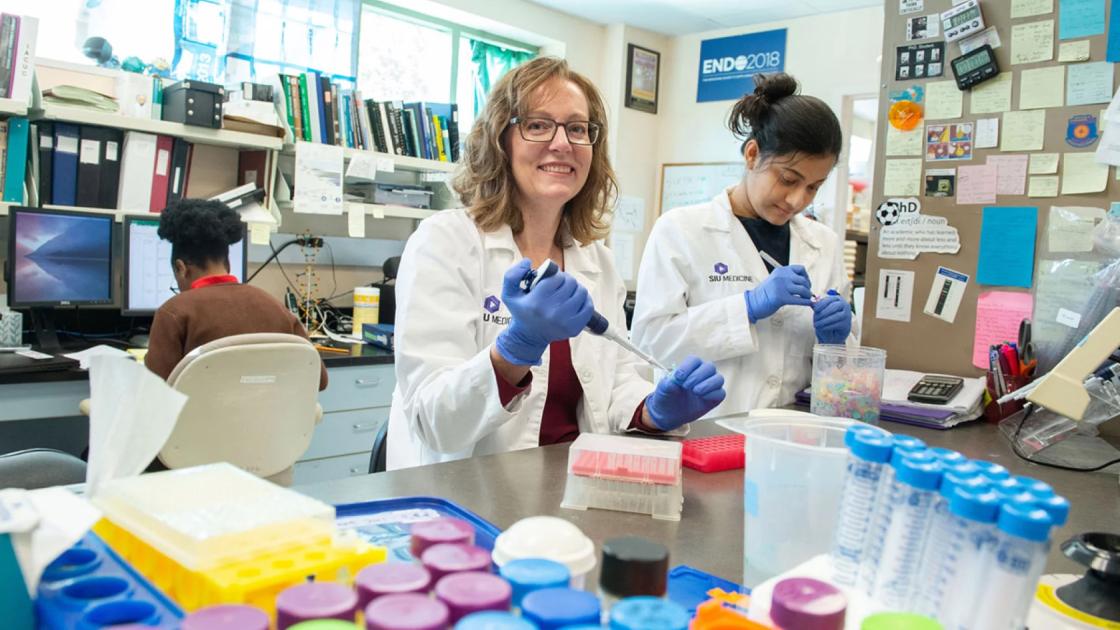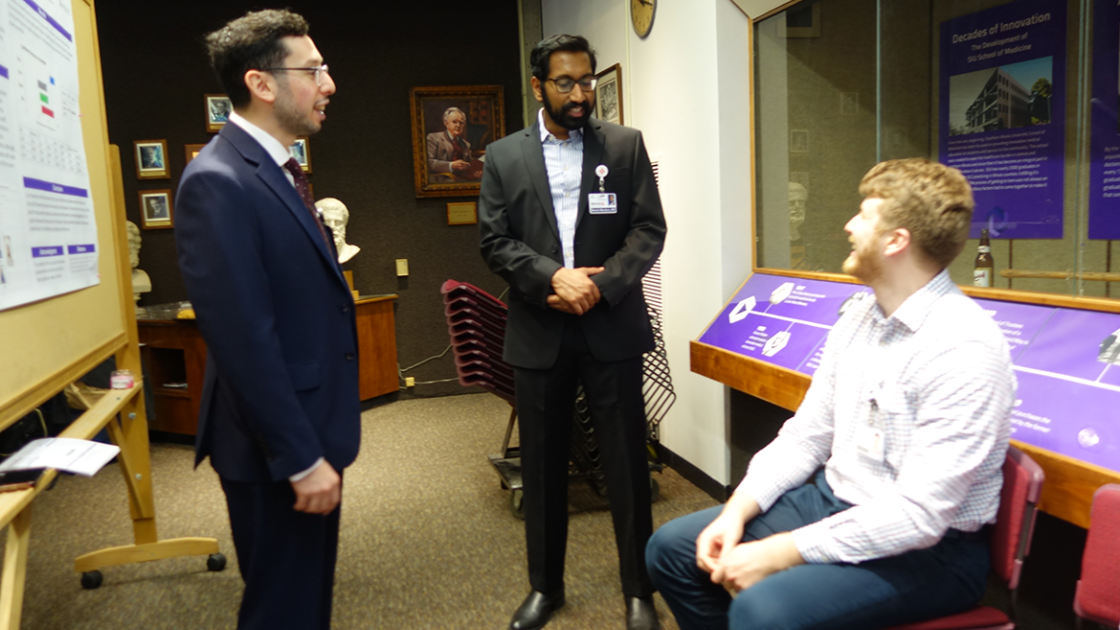
SIU medical researchers seek causes, solutions for pituitary-related conditions
by Christi Mathis | photo by Russell Bailey
About one in 4,000 children are born with a deficiency of one or more pituitary hormones that results in a wide variety of health issues including growth insufficiency, metabolic imbalances, infertility and in some cases, infant death. Buffy Ellsworth, PhD, from Southern Illinois University School of Medicine at Carbondale is part of an extensive $2.77 million multi-university grant-funded research project to unravel the mystery of how congenital hypopituitarism (CH) occurs.
“We want to figure out which genes are involved, where and when it goes wrong,” said Ellsworth, associate professor of molecular and integrative physiology in the Department of Biomedical Sciences.
“It gives us a global look at how gene expression levels are affected and helps us understand what that gene is doing. That can hopefully help us figure out how to fix it. It is hard to identify which mutations cause the problem, but if we can, it can play a broader role in finding solutions.”
Mice provide vital clues
The pituitary gland, which sits beneath the brain, is important for reproduction, lactation, thyroid and adrenal function, and growth. Its function is regulated, primarily, by a part of the brain called the hypothalamus. More than 60 genes can cause CH, and many were first discovered in mice, Ellsworth said. However, about 81% of CH patients don’t have a molecular diagnosis, which involves assessing their DNA, the unique genetic code found within cells. Having that diagnosis is vital for planning treatment and predicting future risks, and that is what this project is all about.
“We are poised to make a significant impact on the discovery of genetic mutations that affect hypothalamic-pituitary gland development,” Ellsworth said.
With patients who have CH, something goes awry in the development of the pituitary gland while they are embryos. CH can also affect non-pituitary tissues, including the central nervous system or ocular and/or facial structures, which may result in intellectual disability, cleft palate or visual impairment. CH may require lifelong hormone-replacement therapy and can significantly affect quality of life.
“The implications of this research extend well beyond pituitary issues, as most of the genes we are studying are important in many organs,” Ellsworth said.
Mapping out exactly what went wrong, where and when within the developing pituitary gland is the key to providing effective treatments.
Creating a road map
A Eunice Kennedy Shriver National Institute of Child Health and Human Development grant totaling $2,771,644 was awarded to Ellsworth and researchers from three other universities for the project “Discovery Pipeline for Genetic Defects in Hypothalamic-Pituitary Development Using International Mouse Phenotyping Consortium Mice.”
The team of researchers, all with expertise in hypothalamic-pituitary development, mouse phenotyping and bioinformatics, will analyze the physical expression of genes in the hypothalamus and pituitary gland in a select group of mice during the next four years. The collaborative research project includes Sally Camper at the University of Michigan School of Medicine; Shannon Davis at the University of South Carolina, and Lori T. Raetzman at the University of Illinois Urbana-Champaign.
The team will be performing detailed genetic analysis of 18 mouse lines with malformations in the hypothalamus and/or pituitary gland to expand the understanding of CH in humans. This set of genes is grouped based on function, including epigenetic regulators, components of the hairlike cilia in cells, protein modification and other novel functional categories.
“We have gone through and systematically made mouse models but are now going to analyze the effects of the mutations, and we are especially focusing on embryonic development,” Ellsworth said. “Those 18 mutations have been divided among the four campuses. Our interest at SIU is on the ciliopathy genes – which can cause cognitive impairments, renal dysfunction and other issues – and how they regulate pituitary gland development.”
They have collaborated with Maria Ines Perez-Millan at the University of Buenos Aires and her colleagues. The South American group works with people who have pituitary hormone deficiencies, and Ellsworth will study mouse models with mutations in the genes Perez-Millan has identified in CH patients.
“If we can better understand what is causing their problems, then maybe we can figure out how to fix it,” Ellsworth said. “Sometimes there are drugs that affect how different proteins function. Researchers are getting closer and closer to being able to do gene editing so they can fix genetic problems. None of these happen in a vacuum. Understanding how everything works and the implications for similar genetic pathways will help us figure out how to address these problems.”
Implications for human health
There are several steps in the process. Researchers will examine the temporal and spatial expression of selected genes in mice from mid-gestation to birth and will assess for specific defects in pituitary hormone-producing cells and vascular defects, and they will determine the overall effect of developmental defects that occur. As they examine the mouse models, they will evaluate how the pituitary gland forms, how it functions and how the hormone-producing cells develop. They are also measuring gene expression – genes are transcribed into RNA, which is translated into protein.
Pratyusa Das, a doctoral candidate in molecular, cellular and systemic physiology, and researcher Sandria Athul are helping Ellsworth with the project. Magdalene Pine Adjei, a graduate student in molecular cellular systemic physiology with a rotating research assignment, also assisted.



